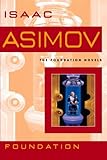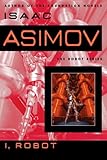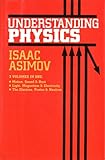|
|
Help |
| Home - Authors - Asimov Isaac (Books) | |
e99 Online Shopping Mall
|
|
Help |
| Home - Authors - Asimov Isaac (Books) | |
| 1-20 of 106 | Next 20 |
click price to see details click image to enlarge click link to go to the store
| 1. Foundation (Foundation Novels) by Isaac Asimov | |
 | Paperback: 272
Pages
(2008-04-29)
list price: US$15.00 -- used & new: US$6.28 (price subject to change: see help) Asin: 0553382578 Average Customer Review: Canada | United Kingdom | Germany | France | Japan |
|
Editorial Review Product Description Customer Reviews (385)
| |
| 2. Foundation and Empire (Foundation Novels) by Isaac Asimov | |
 | Paperback: 272
Pages
(2008-04-29)
list price: US$14.00 -- used & new: US$7.87 (price subject to change: see help) Asin: 0553382586 Average Customer Review: Canada | United Kingdom | Germany | France | Japan |
|
Editorial Review Product Description Customer Reviews (96)
| |
| 3. I, Robot by Isaac Asimov | |
 | Paperback: 256
Pages
(2008-04-29)
list price: US$15.00 -- used & new: US$5.79 (price subject to change: see help) Asin: 055338256X Average Customer Review: Canada | United Kingdom | Germany | France | Japan |
|
Editorial Review Product Description Customer Reviews (228)
| |
| 4. Second Foundation (Foundation Novels) by Isaac Asimov | |
 | Paperback: 272
Pages
(2008-04-29)
list price: US$14.00 -- used & new: US$6.66 (price subject to change: see help) Asin: 0553382594 Average Customer Review: Canada | United Kingdom | Germany | France | Japan |
|
Editorial Review Product Description Customer Reviews (75)
| |
| 5. Isaac Asimov: The Complete Stories, Vol. 1 by Isaac Asimov | |
 | Paperback: 624
Pages
(1990-10-01)
list price: US$22.95 -- used & new: US$12.99 (price subject to change: see help) Asin: 038541627X Average Customer Review: Canada | United Kingdom | Germany | France | Japan |
|
Editorial Review Product Description Customer Reviews (18)
| |
| 6. The End of Eternity by Isaac Asimov | |
 | Hardcover: 256
Pages
(2010-01-05)
list price: US$24.99 -- used & new: US$10.25 (price subject to change: see help) Asin: 0765319187 Average Customer Review: Canada | United Kingdom | Germany | France | Japan |
|
Editorial Review Product Description One of Isaac Asimov’s SF masterpieces, this stand-alone novel is a monument of the flowering of SF in the twentieth century. It is widely regarded as Asimov’s single best SF novel. Andrew Harlan is an Eternal, a member of the elite of the future. One of the few who live in Eternity, a location outside of place and time, Harlan’s job is to create carefully controlled and enacted Reality Changes. These Changes are small, exactingly calculated shifts in the course of history, made for the benefit of humankind. Though each Change has been made for the greater good, there are also always costs. Customer Reviews (66)
| |
| 7. The Currents of Space by Isaac Asimov | |
 | Paperback: 240
Pages
(2010-09-28)
list price: US$14.99 -- used & new: US$6.50 (price subject to change: see help) Asin: 0765319179 Average Customer Review: Canada | United Kingdom | Germany | France | Japan |
|
Editorial Review Product Description Customer Reviews (33)
| |
| 8. Isaac Asimov's Book of Facts: 3000 of the Most Entertaining, Interesting, Fascinating, Unusual and Fantastic Facts by Isaac Asimov | |
 | Paperback: 504
Pages
(1992-10-25)
list price: US$14.95 -- used & new: US$29.99 (price subject to change: see help) Asin: 0803893477 Average Customer Review: Canada | United Kingdom | Germany | France | Japan |
|
Editorial Review Product Description Customer Reviews (16)
| |
| 9. Asimov's Guide to the Bible: Two Volumes in One, the Old and New Testaments by Isaac Asimov | |
 | Hardcover: 1295
Pages
(1981-12-12)
list price: US$19.99 -- used & new: US$45.00 (price subject to change: see help) Asin: 051734582X Average Customer Review: Canada | United Kingdom | Germany | France | Japan |
|
Editorial Review Product Description Customer Reviews (64)
| |
| 10. Foundation and Earth by Isaac Asimov | |
 | Mass Market Paperback: 528
Pages
(2004-08-31)
list price: US$7.99 -- used & new: US$4.23 (price subject to change: see help) Asin: 0553587579 Average Customer Review: Canada | United Kingdom | Germany | France | Japan |
|
Editorial Review Product Description Customer Reviews (95)
| |
| 11. S as in Zebatinsky by Isaac Asimov | |
 | Kindle Edition:
Pages
(2010-03-02)
list price: US$0.99 Asin: B003AQBC5S Canada | United Kingdom | Germany | France | Japan |
|
Editorial Review Product Description | |
| 12. The Complete Stories: v. 2 by Isaac Asimov | |
 | Paperback: 464
Pages
(1995-01-09)
list price: US$14.45 -- used & new: US$7.75 (price subject to change: see help) Asin: 0006480160 Average Customer Review: Canada | United Kingdom | Germany | France | Japan |
|
Editorial Review Product Description Customer Reviews (1)
| |
| 13. Robots and Empire by Isaac Asimov | |
 | Mass Market Paperback: 512
Pages
(1994-01-10)
list price: US$14.45 -- used & new: US$8.56 (price subject to change: see help) Asin: 0586062009 Average Customer Review: Canada | United Kingdom | Germany | France | Japan |
|
Editorial Review Product Description Customer Reviews (44)
| |
| 14. The Robots of Dawn by Isaac Asimov | |
 | Mass Market Paperback: 448
Pages
(1994-03-01)
list price: US$7.99 -- used & new: US$4.01 (price subject to change: see help) Asin: 0553299492 Average Customer Review: Canada | United Kingdom | Germany | France | Japan |
|
Editorial Review Product Description Customer Reviews (68)
| |
| 15. Isaac Asimov's Guide to Earth and Space by Isaac Asimov | |
 | Mass Market Paperback: 288
Pages
(1992-11-23)
list price: US$6.99 -- used & new: US$3.49 (price subject to change: see help) Asin: 0449220591 Average Customer Review: Canada | United Kingdom | Germany | France | Japan |
|
Editorial Review Product Description Customer Reviews (8)
| |
| 16. Isaac Asimov's Treasury of Humor by Isaac Asimov | |
 | Paperback: 448
Pages
(1991-02-04)
list price: US$16.00 -- used & new: US$3.34 (price subject to change: see help) Asin: 0395572266 Average Customer Review: Canada | United Kingdom | Germany | France | Japan |
|
Editorial Review Product Description Customer Reviews (10)
| |
| 17. The Earth (Isaac Asimovs 21st Century Library of the Universe, the Solar System) by Isaac Asimov, Richard Hantula | |
 | Paperback: 32
Pages
(2004-03)
list price: US$15.98 -- used & new: US$7.89 (price subject to change: see help) Asin: 1591021774 Canada | United Kingdom | Germany | France | Japan |
|
Editorial Review Product Description | |
| 18. Understanding Physics, 3 Volumes in One: Motion, Sound & Heat; Light, Magnetism & Electricity; The Electron, Proton & Neutron (v. 1-3) by Isaac Asimov | |
 | Hardcover: 768
Pages
(1988-06)
list price: US$9.95 -- used & new: US$27.99 (price subject to change: see help) Asin: 0880292512 Average Customer Review: Canada | United Kingdom | Germany | France | Japan |
|
Editorial Review Product Description Customer Reviews (11)
| |
| 19. Nightfall and Other Stories by Isaac Asimov | |
| Paperback:
Pages
(1969)
Asin: B000NV8OU4 Canada | United Kingdom | Germany | France | Japan | |
| 20. The Mammoth Book of Golden Age SF: Ten Classic Stories from the Birth of Modern Science Fiction Writing | |
 | Paperback: 512
Pages
(2007-01-24)
list price: US$13.95 -- used & new: US$3.77 (price subject to change: see help) Asin: 0786719052 Average Customer Review: Canada | United Kingdom | Germany | France | Japan |
|
Editorial Review Product Description Customer Reviews (1)
| |
| 1-20 of 106 | Next 20 |